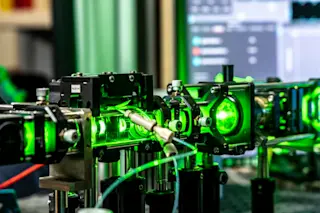A year ago I wrote in DISCOVER's October issue that technological innovation was a powerful engine driving our national economic growth. I called for continued research, development, and investment in the new technologies that will lead us into the twenty-first century, and I outlined President Clinton's vision for the National Information Infrastructure--a seamless web of communication networks, computers, data bases, and consumer electronics that will put vast amounts of information at users' fingertips and will forever change the way we live, learn, work, and communicate with each other.
One year later, technological innovation continues to be a priority for our nation. In fact, with the countries of the world becoming increasingly interdependent, the need to create an information superhighway has reached beyond our borders. In the future, a global "network of networks" will be essential for expanded business and trade opportunities, improved education and health care, preservation and promotion of ...














